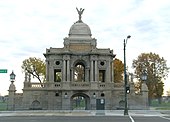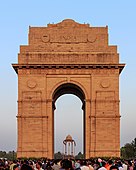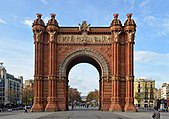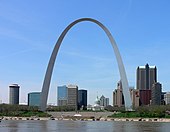Memorial gates and arches
This article needs additional citations for verification. (December 2018) |
Memorial gates and arches are architectural monuments in the form of gates and arches or other entrances, constructed as a memorial, often dedicated to a particular war though some are dedicated to individuals. The function, and very often the architectural form, is similar to that of a Roman triumphal arch, with the emphasis on remembrance and commemoration of war casualties, on marking a civil event (the country's independence, for example), or on providing a monumental entrance to a city, as opposed to celebrating a military success or general, though some memorial arches perform both functions. They can vary in size, but are commonly monumental stone structures combining features of both an archway and a gate, often forming an entrance or straddling a roadway, but sometimes constructed in isolation as a standalone structure, or on a smaller scale as a local memorial to war dead. Although they can share architectural features with triumphal arches, memorial arches and gates constructed from the 20th century onwards often have the names of the dead inscribed on them as an act of commemoration.
Memorial gates
Europe
Belgium
France
Germany
United Kingdom
-
Menin Gate, Ypres, Belgium
-
Porte Désilles, Nancy, France
-
Brandenburg Gate, Berlin, Germany
North America
Canada
United States
- Hurlbut Memorial Gate, Detroit
- Confederate Memorial Gates in Mayfield
- Confederate Memorial Gateway in Hickman
- Soldiers Memorial Gate (Brown University)
-
Soldiers Memorial Gate, Brown University, Providence, Rhode Island, USA
Memorial arches
Asia
Afghanistan
- Taq-e Zafar (Arch of Victory) (1928), Paghman
India
- India Gate (1931), New Delhi
- Gateway of India (1924), Mumbai
- Sabhyata Dwar (2018), Patna
Iraq
- Swords of Qādisīyah (Victory Arch) (1989), Baghdad
Saudi Arabia
- Mecca Gate (1979), Jeddah
- Heroes' Gate (2013), Riyadh
-
The Taq-e Zafar (Arch of Victory) in the gardens of Paghman near Kabul, Afghanistan, built to commemorate Afghan independence after the Third Anglo-Afghan War in 1919
-
The India Gate, built in 1921–1931, is a war memorial located near the Rajpath, on the eastern edge of the "ceremonial axis" of New Delhi, India.
-
The Gateway of India is an arch-monument built in 1913–1924 in Mumbai, India, to commemorate the landing of Emperor George V, the first British monarch to the country, in December 1911.
-
The Victory Arch (officially known as the Swords of Qādisīyah), dedicated in 1989, marks the entrances to the Grand Festivities Square in Baghdad, Iraq.[1]
Europe
Belgium
- Cinquantenaire Arcade (1905), Brussels
France
- Thiepval Memorial (1932), Thiepval
Germany
Ireland
- Fusiliers' Arch (1907), Dublin
Italy
- Arco della Vittoria (1931), Genoa
North Macedonia
- Porta Macedonia (2012), Skopje
Portugal
- Rua Augusta Arch (1873), Lisbon
Spain
- Arc de Triomf (1888), Barcelona
United Kingdom
- Arch of Remembrance (1925), WWI memorial in Leicester
- City War Memorial (1927), WWI memorial in Nottingham
-
The Cinquantenaire Arcade in Brussels, Belgium, built for the National Exhibition of 1880 to commemorate the 50th anniversary of Belgian independence
-
The Siegestor in Munich, Germany, a Bavarian army monument, destroyed in World War II but partially rebuilt as a reminder for peace
-
Porta Macedonia in Skopje, North Macedonia, is dedicated to 20 years of Macedonian independence, 2012
-
The Rua Augusta Arch in Praça do Comércio, Lisbon, Portugal, built to commemorate the city's reconstruction after the 1755 earthquake
-
The Arc de Triomf in Barcelona, Spain, built in 1888 as the main access gate for the 1888 Barcelona World Fair
North America
Canada
- Peace Arch (1921), Canada–US border
- National War Memorial (1939), Ottawa
- Royal Military College of Canada Memorial Arch, Kingston
Mexico
- Monumento a la Revolución (1938), Mexico City
United States
- Memorial Arch of Tilton (1882), Northfield, New Hampshire
- Soldiers and Sailors Memorial Arch (1886), Hartford, Connecticut
- Washington Square Arch (1892), Manhattan, New York City
- War Correspondents Memorial Arch (1896), Gathland State Park, Maryland
- Confederate Memorial (1902), Fulton, Kentucky
- Confederate Soldier Memorial (1902), Columbus, Ohio
- Smith Memorial Arch (1912), West Fairmount Park, Philadelphia, Pennsylvania
- Pennsylvania State Memorial, Gettysburg (1914), Pennsylvania
- National Memorial Arch (1917), Valley Forge, Pennsylvania
- Victory Arch (1919), Macarty Square, New Orleans, Louisiana[2]
- Victory Gate (1919, razed 1920), Madison Square Park, Manhattan, New York City
- Rosedale World War I Memorial Arch (1924), Kansas City, Kansas
- Memorial Arch (1924), Huntington, West Virginia
- Gateway Arch (1965), St. Louis, Missouri
-
Monumento a la Revolución in Mexico City, Mexico, the tallest memorial arch in the world, 1938
-
Washington Square Arch, Manhattan, New York City, USA
-
National Memorial Arch, a Revolutionary War memorial in Valley Forge National Historical Park, Chester County, Pennsylvania, USA
References
- ^ Al-Khalilm, S. and Makiya, K., The Monument: Art, Vulgarity, and Responsibility in Iraq, pp. 10–12
- ^ "World War I, Victory Arch, New Orleans, Louisiana". freepages.rootsweb.com.





















